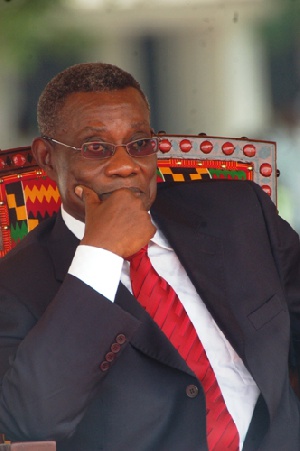Government is spending GH¢160,510,000 on selected children and wards of ‘party cronies’ to study medicine in Cuba.
The 250-student delegation left Ghana last Monday, May 21, 2012 to begin the 6-year course under the new medical cooperation agreement between Ghana and Cuba.
The Cuban government is paying nothing but rather the Ghana government taking all the costs involved, totalling GH¢160 million in a deal brokered by Vice President John Mahama.
The criteria for the selection of the candidates and the cost involved have raised questions.
In spite of the fact that government has kept details of the programme under wraps, DAILY GUIDE has stumbled on copies of documents covering the deal.
In all, the Presidency, Ministers and the Scholarships Secretariat itself, were made to submit a ‘protocol’ list of 138 individuals whilst the Office of the Vice President and that of the National Security Coordinator, Lt. Col. Larry Gbevlo-Lartey (Rtd), increased the number with a supplementary list of 41 names.
All 10 regional caucus chairmen of the ruling NDCs were equally given concessions to submit a list of party faithful for consideration as well as ministers and their surrogates.
The regional distribution of the largesse clearly ignored indigenes of the Ashanti Region with Akan names absent. Those who were considered for the largesse in the Ashanti Region bear Islamic names, suggesting that northerners living in the region were considered in favour of their Akan counterparts in a clear case of regional imbalance.
This showed that the selection was tainted with political consideration and cronyism.
Some had their names under various caucuses in the selection criteria to boost their chances.
In a ‘secret’ cabinet memo from former Health Minister, Joseph Yieleh Chireh, dated August 18, 2011, which was approved by Chief of Staff, John Henry Martey Newman, he sought to justify the amount being spent on the training of 250 individuals relating to its relevance to the current doctor-patient ratio in Ghana which stands at 1:11,500.
For this reason, he explained that “majority of the populace does not have ready access to the services of a doctor.”
He pegged the cost of training a Senior High School (SHS) graduate as medical officer in Cuba at Cuc30, 750.00, the equivalent of GH¢50, 660.12 a year.
It would therefore cost the nation GH¢10, 132, 024.00 to train 200 students to read medicine in Cuba each year and GH¢60, 792, 144.00 for the next 6 years that they are scheduled to be there, whilst an amount of GH¢48,189.12 would be spent on another 50 students per annum to receive specialist training in that country.
This works out to GH¢2,409, 456, making the total budget for the 4-year period that they would undergo the specialist training an amount of GH¢9, 637, 824.00 whilst the budget for the basic training of doctors and specialists is GH¢74,344, 960.00 for the period under review.
For the first year, 2012, government is expected to cough up an amount of GH¢14, 498, 960 whilst the total cost of budget for the services of the 300 Cuban doctors who are currently in Ghana involves GH¢14, 360, 850.00 per annum.
Each of these Cuban doctors in Ghana is being maintained at a cost of well over GH¢48,000 per annum including a return air-ticket (economy class) each for annual leave, travel allowance, free meals, free accommodation, transport to work, utility charges, cost of participation in annual scientific seminar etc.
Checks by DAILY GUIDE have established that this exclusive privilege to the ordinary Cuban medical doctor in Ghana is not available to the Ghanaian medical consultant (specialist) let alone the house officer.
These developments come in the wake of unsettled salary grievances and hospital infrastructure problems at the Komfo Anokye Teaching Hospital (KATH).
The cost involved in training a medical student at the University of Ghana Medical School (UGMS) currently stands at GH¢700.00 per annum for regular students and GH¢3, 000 for the fee-paying students.
With the problem of inadequate infrastructure in the country’s medical schools remaining unresolved and parents’ continuous worry over the fact that their wards cannot get access to medical education in Ghana, some pundits have suggested that the money being pumped into Cuba could have otherwise been used to resource the country’s medical schools to increase the enrolment.
Some people believe that 250 students can be absorbed by one of the country’s public medical schools if half of the money was given to them to upgrade their facilities.
General News of Thursday, 24 May 2012
Source: Daily Guide
Govt Spends GH¢160,510,000 On Wards Of 'Party Cronies' To Study
Entertainment












